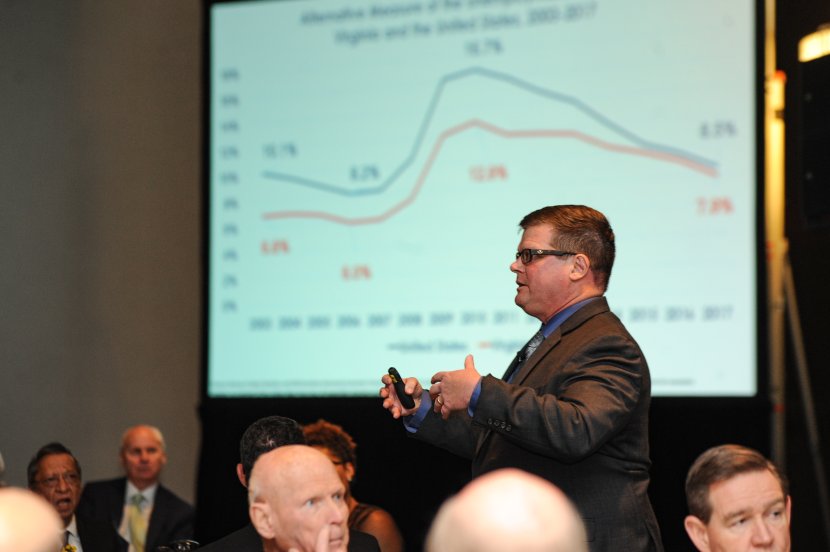The coverage, capacity and speed of mobile communication networks could provide the cornerstone of future rural economic growth - or cause even greater disparities because of an urban-rural digital divide.
That's the key finding of a study led by Old Dominion University researchers, who interviewed and surveyed rural South Dakota residents to determine if the quality of mobile networks influences the quality of life in rural America.
Researchers at the University of South Dakota were asked in 2018 by telecommunications company T-Mobile to examine how uneven access to the internet in different parts of the state affects economic opportunity.
David Earnest, chair of the political science department at that university, reached out to colleagues at his former employer, Old Dominion, where he served as associate dean of the College of Arts & Letters until 2017.
In the second half of 2018, researchers from ODU's Dragas Center for Economic Analysis and Policy and Social Science Research Center interviewed rural South Dakota residents in communities such as Springfield, Elk Point and Wakonda. They also interviewed students at the University of South Dakota, while other residents of the state completed a web-based survey, to paint a detailed picture of rural internet access and reliability.
Residents of that largely rural state confirmed the presence of an urban-rural divide in mobile coverage. "This divide not only created problems for everyday discourse, but also inhibited the ability of Emergency Management Services (EMS) to perform routine tasks," the report noted.
Along with Earnest, study authors include principal investigator Robert McNab, director of ODU's Dragas Center for Economic Analysis and Policy; Vinod Agarwal, director of the Economic Forecasting Project in the Dragas Center; Barbara Blake, chief administrative officer of the Dragas Center; Randy Gainey and Tancy Vandecar-Burdin, faculty director and associate director of the Social Science Research Center; and James V. Koch, Board of Visitor Professor of Economics and President Emeritus of Old Dominion University.
"ODU's Dragas Center for Economic Analysis and Policy and the Social Science Research Center both enjoy a national reputation for the excellence of their research," said Earnest, the Odeen-Swanson Distinguished Professor of Political Science at the University of South Dakota.
"When I learned we needed a quick turnaround on the study, ODU was my first choice for a partner - I knew ODU would deliver insightful and original research, on time and on budget."
McNab, an economist, said South Dakota's economy has grown faster than the national average for the past two decades.
"That economy has also diversified over the past few decades, shifting toward a service-oriented model that requires consistent access to the internet," he said.
However, many residents describe rural internet services in negative terms. They suggested they are making the best of their technological situation, while at the same time noting that their rural networks have insufficient coverage, capacity and speed for basic health and safety, let alone quality of life.
As one respondent noted: "If the Taliban can upload videos in Afghanistan, how can I not get Netflix to play in America?"
Even robust economic growth in South Dakota has not prevented an outmigration of citizens from rural areas, a trend that is likely to accelerate as the urban-rural disparity deepens.
The Federal Communications Commission is planning to spend more than $6 billion over the next decade and ease regulatory requirements to close the digital divide. The study by University of South Dakota and ODU researchers attempted to focus on one largely rural state and add the voices of residents to the ongoing analysis of the coverage, capacity and speed of mobile networks.
After analyzing the residents' responses, the report researchers suggest that investments in mobile internet, particularly new fifth-generation (5G) networks, could help rural areas better compete in a global economy, and more cost-efficiently than broadband.
The study notes that investments in mobile networks are necessary to sustain economic growth and improve the quality of life. "If South Dakota wishes to broaden its economic base and participate in the scientific and engineering developments that propel many other states, it must consciously promote investments in technology," it said.
Please go to the following link for the FULL REPORT.
Related News Stories
University Economists Warn of Potential Problems in Annual Report
Hampton Roads is poised for a solid 2019, but persistent issues loom over the local, state and national economies. (More)
Life in Hampton Roads Survey Examines Politics, Social Issues and Perception of Police
The report examines regional perceptions of political figures and political affiliation from the 2018 Life in Hampton Roads survey (LIHR 2018) conducted by the Old Dominion University Social Science Research Center. (More)
"Kings Dominion Law" Does Little Harm or Good, ODU Analysis Finds
The Annual State of the Commonwealth Report says debate over the measure, which limits school openings before Labor Day, is "over very small stakes." (More)







